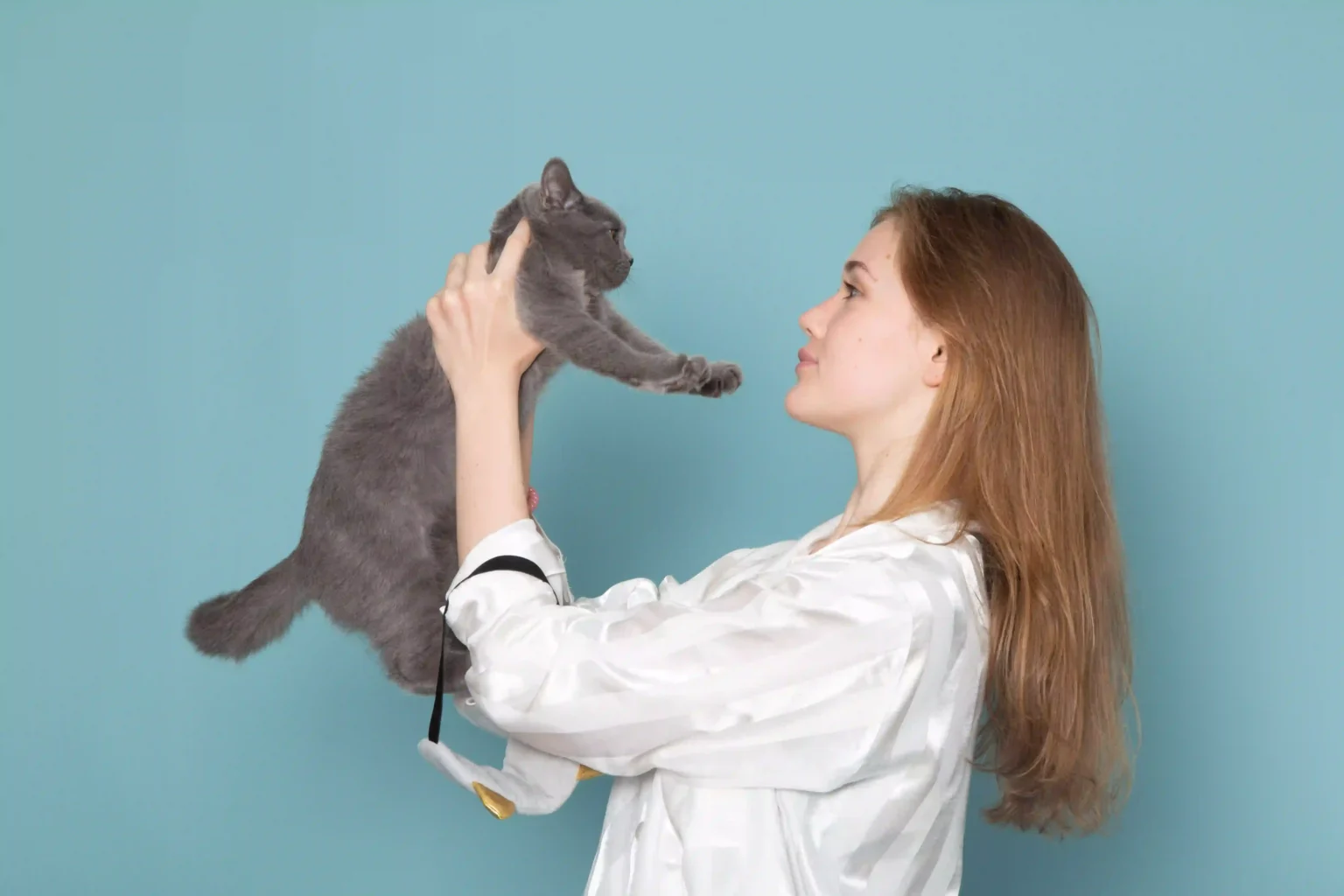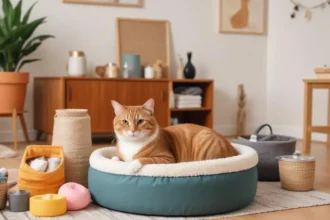Due to their independent yet loving personalities, cats make wonderful family members, and their owners take great pride in taking care of them. It is crucial to give your cat a healthy, balanced diet, taking into account their age, weight, and any dietary requirements. A feeding plan can be customized with regular visits with your veterinarian, guaranteeing your cat gets the nutrition it needs for optimum health. For your cat to be healthy overall, drinking enough water is just as important as feeding them a balanced diet.
Cats are known for consuming insufficient amounts of water, which can result in several health concerns, including urinary tract infections. Make sure your cat always has access to clean, fresh water to promote hydration.
Additionally, your veterinarian can keep an eye on your cat’s weight, respond quickly to any issues, and modify their diet as necessary for various life phases. This cooperative approach between vets and cat owners highlights the value of customized treatment, making sure that your feline companion thrives on a diet catered to their unique requirements.
Nutritious Diet
Providing your cat with healthy food is essential to ensuring that they stay in good health. It is crucial to choose cat food that not only fits but also surpasses their unique nutritional needs and life stage.
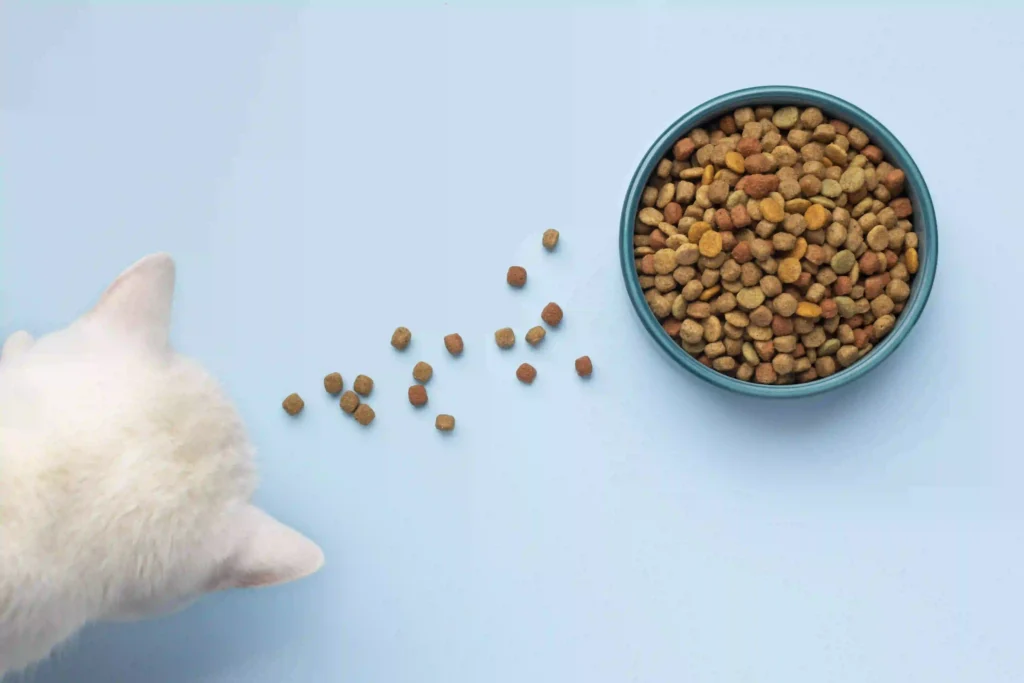
To promote your cat’s general health, choose premium food that is abundant in important nutrients including proteins, vitamins, and minerals. Work closely with your veterinarian to develop a feeding schedule that meets the specific dietary requirements of your cat. This might involve figuring out appropriate serving sizes and creating a feeding schedule that fits your cat’s unique metabolism and way of life.
The importance of a balanced diet in the quest for a healthy feline friend cannot be explained. A healthy diet for cats promotes their physical well-being and helps them maintain strong bones, a glossy coat, and a healthy immune system.
| Formula Component | Consideration |
|---|---|
| High-Quality Ingredients | Prioritize formulas that place high-quality ingredients first, avoiding unnecessary fillers. |
| Age-Related Nutritional Changes | Be attentive to your cat’s nutritional needs as they age, adjusting their diet accordingly for optimal health. |
| Dietary Adjustments for Health | Monitor and adapt your cat’s diet if they have specific health issues to ensure overall well-being and longevity. |
Hydration
Keeping your cat hydrated is just as important to their health as feeding them a balanced diet. Due to their selective drinking habits, cats may not always drink enough water, thus owners must take preventative precautions.
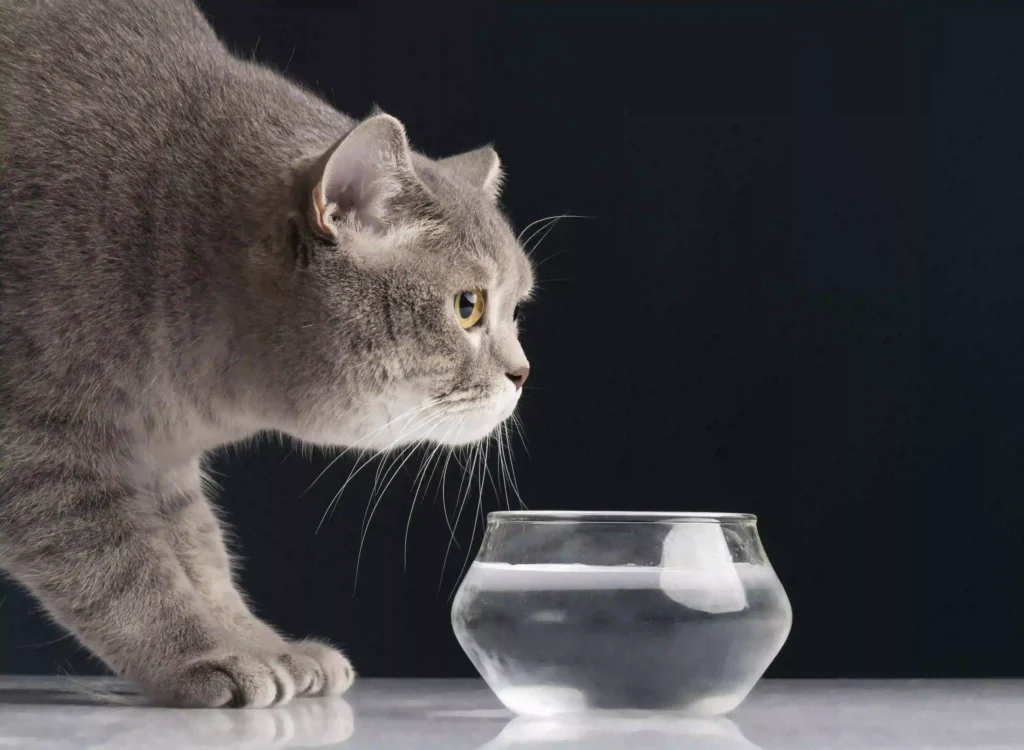
Your cat friend should always have access to a clean, fresh supply of water throughout the day. This supports not only the preservation of their general well-being but also the avoidance of conditions like urinary tract infections. Purchasing a cat water fountain can satisfy some cats’ particular preferences, particularly those that show a fondness for flowing water.
Recognizing and catering to your cat’s thirst needs will make a big difference in their general well-being. You’re taking proactive preventive action by recognizing their preference for running water and adding a cat water fountain to their surroundings. Moreover, spending money on a water fountain shows that you are dedicated to designing a space that complements your cat’s innate desires and instincts. Giving your cat’s water needs top priority is a proactive way to ensure their well-being and create a happy, pleased feline friend.
Regular Veterinary Check-ups
Placing your cat’s health first means not just feeding them a balanced food and making sure they get enough water, but also taking preventative steps like scheduling routine veterinary exams.
- Routine Health Assessments
- A comprehensive physical examination is part of routine check-ups, and it involves evaluating your cat’s eyes, ears, nose, teeth, coat, and general health.
- Your cat’s general health will be assessed by your veterinarian by taking measurements of vital signs such as body temperature, heart rate, and breathing rate.
- Vaccination Schedule
- Your veterinarian may modify the immunization schedule based on your cat’s way of life. For instance, cats that live outside might need to have additional shots.
- Talk about the necessity of booster shots to maintain protection against common illnesses.
- Parasite Prevention
- Since parasites can be active throughout the year, investigate year-round methods of parasite prevention.
- Frequent fecal examinations can aid in the early detection and treatment of internal parasites.
- Dental Health
- To find concealed dental problems beneath the gum line, comprehensive dental examinations may entail X-rays.
- Your veterinarian can provide you with tips on how to take good care of your cat’s teeth at home, such as brushing them.
- Nutritional Guidance
- Talk about tactics for controlling weight, such as sensible serving amounts and food regimens.
- To treat certain health conditions, your veterinarian may prescribe diets if necessary.
- Behavioral Consultations
- To address behavioral difficulties, find ways to improve your cat’s surroundings.
- Get direction on behavioral training methods that use positive reinforcement.
- Microchipping
- To ensure accurate identification, make sure your contact information is current in the microchip registry.
- Speak about the value of utilizing tags and collars in addition to microchipping for increased security.
- Controlling Weight
- To keep an eye on your cat’s weight, learn how to calculate a body condition score at home.
- Find out what kind of exercise is best for your cat given their age, health, and activity level.
Regular veterinary treatment promotes a proactive and preventive approach to your cat’s health and is essential to responsible pet management. Not only do these routine examinations take care of any urgent medical issues, but they also provide you a chance to ask questions about behavior, diet, and other areas of cat care. You form a cooperative relationship with your veterinarian that is aimed at extending the life and health of your beloved feline friend when you communicate openly with them. Frequent trips to the vet demonstrate your dedication to offering complete care, guaranteeing your cat has a happy and healthy life.
Grooming
Maintaining the general health and well-being of your cat depends heavily on regular grooming. Not only is brushing their fur a pleasant treat, but it’s also an essential step in decreasing the development of hairballs, reducing shedding, and preventing matting.
“Grooming is more than fur care; it’s a daily dialogue of love.”
Developing a regular grooming regimen for your cat helps you and your companion form a close relationship while taking care of important physical needs.
During grooming sessions, pay special attention to your cat’s teeth, ears, and nails in addition to their fur. Checking their ears regularly makes it easier to spot any infections or ear mites and treat them quickly. An essential but frequently disregarded component of general well-being is dental health. Regularly brush your cat’s teeth or ask about toys and dental treats that might help them keep their oral hygiene in check. Maintaining your nails is equally vital because having too long nails can be uncomfortable and possibly harmful to your cat’s health.
If your cat isn’t used to being groomed, start with brief, gentle sessions and progressively extend them as they are more at ease. This method makes sure that you and your cat enjoy grooming and don’t feel any tension.
Enrichment and Play
It takes more than simply providing for your cat’s basic needs to ensure their complete health. Their happiness and general health are largely dependent on receiving both mental and physical stimulation. You are actively supporting their enrichment when you include interactive play sessions, a variety of toys, and scratching posts into their daily routine.

Because of their natural curiosity and playful nature, cats do best when they are allowed to exercise both their minds and bodies. A varied selection of toys keeps cats mentally engaged as well as physically active, minimizing boredom and promoting a happy feline friend.
Your cat’s overall growth needs to acknowledge and indulge their natural hunting impulses. Your cat may particularly appreciate toys that stimulate prey, such as feathery wings or small, moving things. Additionally, adding scratching posts to their surroundings helps them keep their claws, reduces tension, and provides a healthy outlet for their need to scratch. Engaging in interactive play sessions with your cat helps to deepen your relationship and create a happy, fulfilling atmosphere where you two may spend time together.
You are supporting your cat’s mental and physical health when you acknowledge the value of play and enrichment in their life. A cat that is active and stimulated is less likely to display behavioral problems like excessive scratching or destructive behavior brought on by indolence You are creating a peaceful and happy life for your cat by playing with it and giving it lots of stimulation. This supports the idea that a contented cat is a healthy cat.
Litter Box Maintenance
Maintaining a neat and hospitable litter box is essential for your cat’s general health and cleanliness. To satisfy your cat’s exacting requirements, regular care is essential, and daily scooping to get rid of waste and clumps is part of this. Furthermore, changing the litter regularly helps keep it fresh and avoids aromas that could deter your cat from using the box, depending on the type of litter used and your cat’s preferences. Not only is a clean litter box a practical need, but it also provides your cat with psychological comfort by reducing stress and encouraging good litter box behaviors.
“A clean litter box is a cat’s comfort zone, where daily care becomes a silent promise of hygiene and harmony.”
Spaying/Neutering
It’s important to think about your cat’s health and well-being if they haven’t had their spayed or neutered yet. Beyond the vital function that spaying and neutering play in preventing unwanted litters and aiding in population control, these procedures also impart significant behavioral and health advantages to your feline friend.
Additionally, neutering and spaying your cat can improve its temperament. It frequently aids in reducing aggressive tendencies, decreasing the chance of roaming and stopping territorial marking. Furthermore, female spayed cats won’t go through heat cycles, which can be a huge comfort for both the owner and the cat.
In addition to improving the general welfare of the feline community, you also give your beloved pet a more peaceful and stress-free living environment by being proactive in controlling their reproductive health. Always speak with your veterinarian to find out when it’s best to spay or neuter your cat, taking into account its age, health, and specific requirements.
Create a Safe and Comfortable Environment
Provide your feline lover with a safe and cozy haven inside your house. Make sure your cat has nice bedding and hiding places so they have places to retreat to when they feel safe and relaxed.
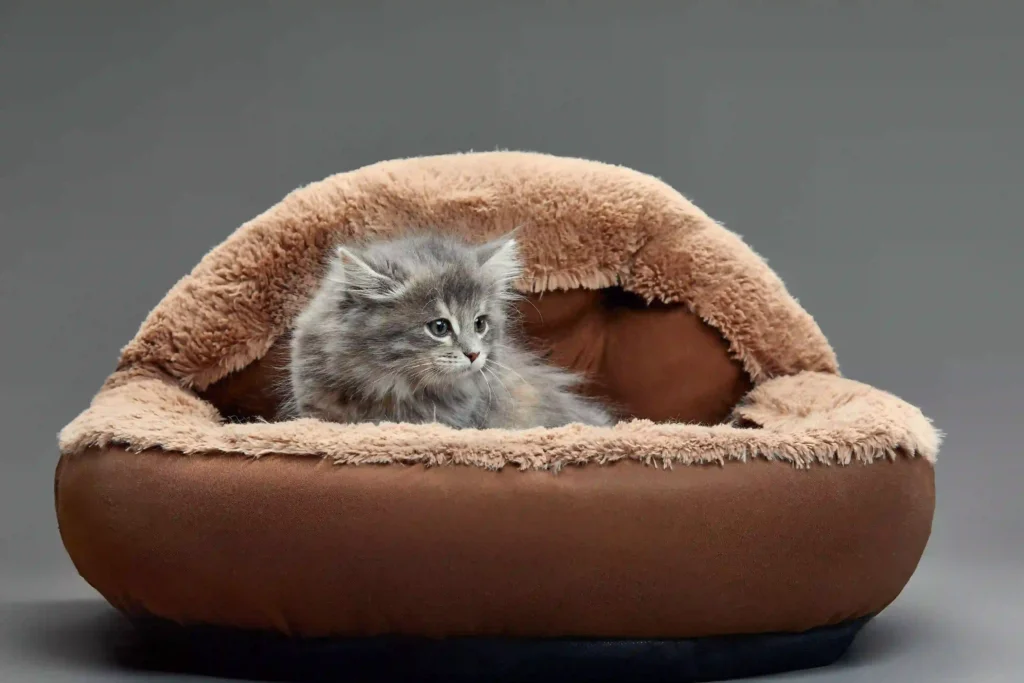
Because cats are innate climbers and watchers, think about including vertical areas like shelves or cat trees so they can indulge their want to study their surroundings from above. This enhances their mental health overall by giving them a sense of control and confidence in their surroundings.
Beyond providing for your cat’s physical needs, including these basic health and care guidelines in their daily routines lays the groundwork for their emotional well-being. It’s critical to acknowledge and value your cat’s originality; and adjust your care routine to suit their particular preferences and sensitivities. Whether it’s creating an alluring vertical playground or the ideal hiding place, tailoring your house to your cat’s requirements makes it a place where they can thrive. A contented and robust feline becomes a treasured friend, offering happiness and coziness to those whose lives are blessed to be entwined with these amazing animals.
Conclusion
Ultimately, putting your cat’s health and well-being first requires a whole-hearted dedication to their diet, vet treatment, and general way of life. The basis for your cat’s physical well-being and lifespan is a nourishing, balanced diet that caters to their demands. You can take a proactive approach to your cat’s care by keeping yourself educated about their specific needs through routine consultations with your veterinarian. You may help ensure that your beloved feline friend has a lifetime of health and happiness by adopting these basic health and care guidelines into your daily routine. This will also help you build a strong and meaningful relationship with your cat. Recall that a contented and robust feline offers happiness and company, therefore allocating time and energy to

